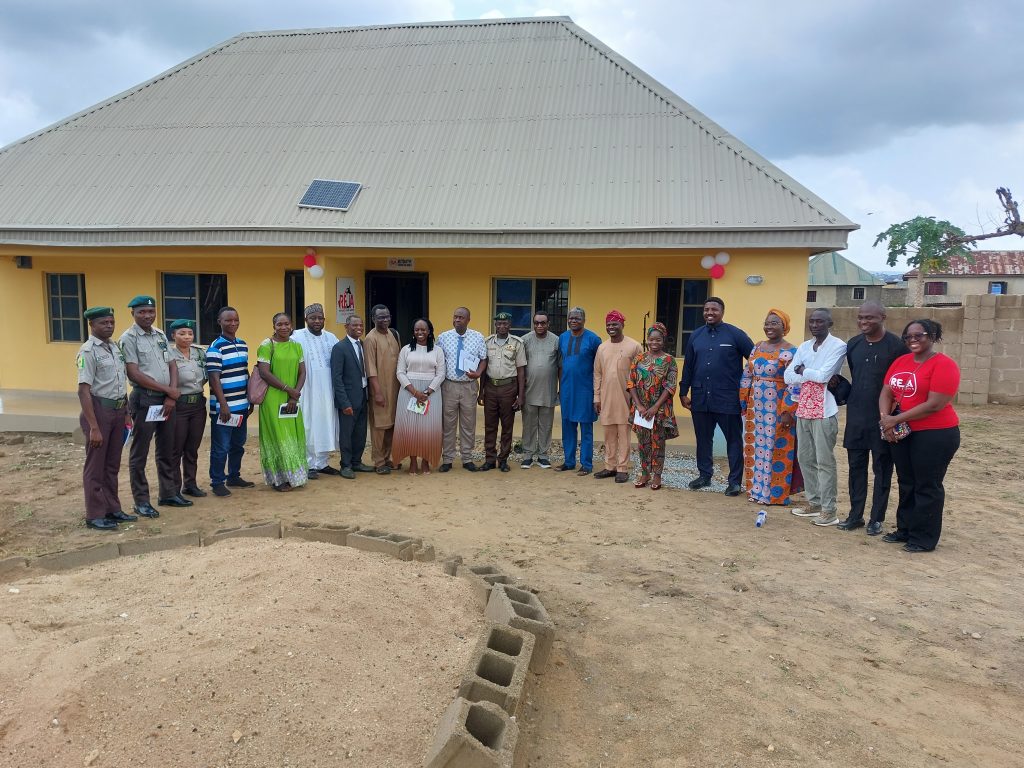
From Left to right: Ms Aisha Bubah, Director, Sunshine Series, Mr Rafiu Lawal, Director, Building Blocks for Peace, Mr Isreal Usman, Human Rights Lawyer and Board Member, REJA, Mr. Yahaya Shafa Representing the Chief Judge of Nasarawa State, The Non-custodial Directorate of the Nigerian Correctional Service, Mr. Nduka representing DG, Leal Aid, Osariemen Grace Omoruyi Shobanke, Executive Director, REJA, Mr Oluwatoyin Badejogbin, Country Director, ROLAC/IIDEA, National President, Mr. Jacob Tsado, National President, Prison Fellowship Nigeria and other guests.
NGO Unveils First Halfway Home for Justice-Impacted Persons in Nasarawa
Restorative Justice for Africa (REJA Initiative), a civil society organisation, has launched the first Halfway Home for formerly incarcerated persons in Nasarawa State.
The unveiling ceremony, which took place in Ado, Karu Local Government Area of the state, was attended by key stakeholders in the criminal justice sector.
Speaking during the launch of the “Restored Voices Shelter,” the Executive Director of REJA Initiative, Mrs Osariemen Grace Shobanke, called for greater efforts to reintegrate unjustly incarcerated persons back into society.
Osarienmen, in a statement on Saturday in Abuja, explained that the initiative is borne out of the need to provide the critical support, dignity and direction for people released from prison, many of whom have nowhere to go.
“We realised that after facilitating the release of many unjustly detained persons, they are left stranded,” she said.
“For several victims who have had everything striped from them, where do they go? As human beings, they deserve a return to a supportive community. That’s why we established this shelter.
“It is not a permanent residence but a post-incarceration transition house to support reintegration. Many of them are still out there, with no place to turn,” she said.
Osriemen, who said REJA conceived the idea in 2022 because the legal support they were providing was not enough, called on government agencies, development partners and individuals to support the efforts to close the reintegration gap within the justice system.
The Chief Judge (CJ) of Nasarawa State, Justice Aisha Bashir-Aliyu, assured of her partnership with the NGO in ensuring proper reintegration of returning citizens in the state.
Represented by the state’s Secretary of the Administration of Criminal Justice Monitoring Committee (ACJMC), Mr Yahaya Shafa, the CJ expressed concern over the lacuna in the justice system reform.
She stated that the system was plagued with recidivism, largely due to a lack of post-release care.
“During our decongestion exercises, we noticed recurring faces. It’s clear many leave detention and return because they have nowhere else to go.
“Some go into correctional facilities innocent, but come out hardened. We must break this cycle,” the CJ said, adding that Nasarawa State was working towards setting up rehabilitation homes for children and vulnerable ex-detainees.
Dr. Oluwatoyin Badejogbin of the Rule of Law and Anti-Corruption Programme (RoLAC), described the project as timely and impactful.
“We are deeply touched by this intervention. What happens to people after their release from prison has always been a concern for us.
“The justice system currently lacks a structured approach for reintegration.
“Without support, many return to crime or suffer social rejection,” he said.
Jacob Tsado of the Prison Fellowship of Nigeria, in a goodwill message, also highlighted ongoing efforts with various state governments to adopt restorative justice practices in the court system as a means of reducing overcrowding in correctional facilities.
A major highlight of the event was the launch of a Model Practice Direction on Restorative Justice for Nigerian Courts, alongside the unveiling and facility tour of the new shelter home, marked by a symbolic ribbon-cutting ceremony.
The project was to ensure a post-incarceration care for the ex-correctional centre inmates, especially those who are unjustly detained.
This project is part of the NGO’s initiatives aimed at tackling the deep-seated issues within the criminal justice system and addressing the root causes of recidivism.
The Halfway home will operate as a self-sustaining facility, led by those who have walked the same path.
